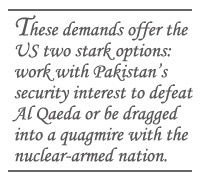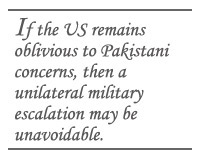Obama’s Afghanistan-Pakistan Quandary – Part II
Obama’s Afghanistan-Pakistan Quandary – Part II

WASHINGTON: Breaking away from the President Bush’s goal of democratization of the Islamic World, President Obama has placed defeating the Al Qaeda terrorist network at the center of the US’s policy goal in Afghanistan and Pakistan. While popular and logical from the American perspective, this approach fails to take into account the interest of the US’s indispensable ally Pakistan, which is concerned with not just Al Qaeda, but also with what it sees as growing Indian influence in Afghanistan and the threat of subversion.
Recent interviews with senior Pakistani military officials make it clear that Pakistani cooperation will depend on the Obama administration’s readiness to contain India’s anti-Pakistani efforts in Afghanistan. What Pakistan demands as the price of its cooperation is, in effect, a reversal of US policy that has tilted in favor of India. But these demands offer the US two stark options: work with Pakistan’s security interest to defeat Al Qaeda or be dragged into a quagmire with the nuclear-armed nation.

While US troop strength in Afghanistan has increased, US officials have repeatedly said that Al Qaeda leadership is now located in Pakistan. How deep America will go, and how it will choose between employing drone attacks or deploying troops in the pursuit of Al Qaeda will depend on Pakistani cooperation. Use of drone attacks on the border region is one thing, but US boots in Pakistan is an uncrossable “red line,” as stated by the administration officials. If in the next 12-18 months US, Afghan and Pakistani militaries fail to reverse al-Qaida’s gains – and worse Al Qaeda relocates deeper inside Pakistan and blends in in the cities away from the drone attacks – the US could sanction extended drone attacks and Special Operations from bases in Afghanistan and Pakistan.
Al Qaeda is, in fact, already moving beyond the tribal areas, facilitated by local alliances and motivated by counterproductive Pakistani counterinsurgency tactics that alienate people through brute force. In the past seven years while Pakistan made short-term political deals with the Taliban, Al Qaeda and associates assassinated national leaders, bombed munitions factories, police training centers, mosques, and girls’ schools. They even extended their attacks to Kabul, London and Mumbai. While angering the US, Pakistan’s duplicitous policy, meanwhile, has failed to achieve its legitimate national security goals – that of fighting Al Qaeda with the Americans, but maintaining its influence in Kabul through pro-Pakistani Pashtuns as a safeguard against a precipitous US withdrawal and perceived threat from India in Afghanistan.

But why is this important? In the early years of the war that defeated the Taliban, leaders in Kabul failed to conciliate pro-Pakistan and moderate Taliban leaders, consistently ignoring their legitimate influence over southeast Afghans, thus increasing Islamabad’s anxieties. President Hamid Karzai gave India unprecedented access, accepting large amounts of socio-economic aid worth $1.2 billion and military training – knowing that Pakistan with its $200 million program could not compete. He also ignored Pakistani allegations of “India’s financial support” for separatists from Pakistan’s Baluchistan province, as military analyst Ayesha Siddiqa has noted. The alleged support could be retaliation against Pakistani backing for the Kashmiri insurgency and the Taliban attack on the Indian embassy in Kabul.
If the US remains oblivious to Pakistani concerns and Pakistanis remain secretive about their duplicitous means in taking care of a perceived Indian threat, then US unilateral military escalation may be unavoidable. In that case Washington should have no illusions: if the United States sends troops, it would face an angry, 175 million strong, nuclear-armed nation, willing to fight for every inch, attracting regional intervention and coalescing with Al Qaeda. An imploding Pakistan could start a domino-effect-war with incalculable consequences for the United States and the world.

How can one stop this doomsday scenario? First, Islamabad must make its security interests clear to Washington: excessive Indian economic or military influence in Kabul believed to be aimed at destabilizing Pakistan is unacceptable. Based on background interviews with dozens of senior Pakistani officers, it is clear that the price that Pakistan wants for its cooperation, in the words of one senior official, that the US state publicly that India “must stop all subversive activities against Pakistan from Afghanistan.” In addition, they want an American/Afghan-brokered multinational agreement to help make Afghanistan a neutral ground, welcoming reconstruction but opposed to covert operations against Pakistan or India or Afghanistan.
Second, if enough moderate Taliban from the southeast, perceived to be pro-Pakistani, participate in the upcoming Afghan elections and are allowed to share power, Pakistan’s clandestine support for the Taliban in Afghanistan is unnecessary. If not, then the Pakistani generals will continue to support the Taliban in Afghanistan, as combatants in “asymmetric warfare against a conventionally superior India,” as military analyst Aqil Shah has noted. This would in turn expand the US-Pakistan trust deficit.
Third, the trust gap between the Pakistani government and its citizens should be eliminated. The main obstacle to effective Pakistani counterinsurgency is not lack of trainers or dollars, but the support of the people. To Pakistanis, the message should be unequivocal: while a reformed US-Pakistan partnership will center on fighting the common Al Qaeda threat and deal with the challenge from radical Tailban and Indian subversion, Pakistan’s sovereignty will not be violated without consent.
Fourth, this should be aided by a massive ‘transparency’ campaign through electronic and print media and notably through radio – a recent survey states, 80% of all tribal area denizens have radios – to explain the US-Pakistan partnership, its military and socio-economic benefits, and its past failures.

Fifth, most US military and intelligence presence in Pakistan must be made public; and ‘missing people,’ or cases of extra-constitutional detentions must be resolved by the newly reinstated judiciary. Renowned Pakistani security analyst, Lt Gen (retired) Talat Masood agrees, “the dual trust deficits between US and Pakistan, and Islamabad and Pakistanis, must be resolved…more transparency will garner public support and American acknowledgement of Pakistani worries of a pro-India Afghanistan will ensure effective Pakistani support for the new US strategy.”
Sixth, despite the failure of peace deals between the Taliban and Islamabad, political reconciliation is still the only logical long-term solution to quelling the insurgency. Future efforts, while sensitive to local demands – better governance, speedy justice, etc. – should be monitored by specific metrics for counterinsurgency success, such as areas under control, attacks on security personnel, etc.
Finally, Pakistan must reject heavy-handed counterinsurgency that leads to heavy causalities and loss of popular support while waiting for the peace deal to break. The recently announced $3 billion in US military aid aims to enhance training and equipment. Moreover the Pakistani law enforcement agencies should be a major recipient because ‘holding’ and ‘building’ relies on effective policing.
On balance, past US strategy in Afghanistan and Pakistan to defeat Al Qaeda failed. The old US joint counterinsurgency policy ignored a regional political strategy and relied on Pakistan’s military to deliver without understanding its security concerns. Unless the US takes Pakistani concerns fully on board, its single-minded attempt to defeat Al Qaeda risks dragging the US deep into Pakistan’s quagmire.
Haider Ali Hussein Mullick is a Senior Fellow at US Joint Special Operations University focusing on US-Pakistan relations, and author of forthcoming, “Pakistan’s Security Paradox: Countering and Fomenting Insurgencies” (JSOU, 2009). To contact the author visit www.haidermullick.com.